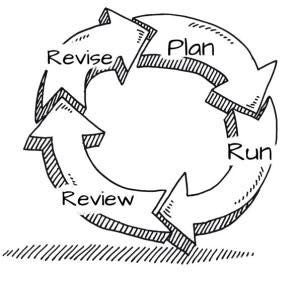
Nothing related to startups should be carved in stone. Best practices can be useful but are best taken as suggestions, not rules. So I’m troubled to see some of the “lean startup” advocates get into the codification business.
I very much respect lean startup thought leaders Eric Ries and Steve Blank and the methodology they popularized at the end of the last decade. The way I see it, a lean startup is one developed along a build-test-revise-build-more-test-more strategy. It’s against long painful planning process that delays a startup for the diminishing returns of waiting too long for too much analysis. It’s a cycle of build, test, correct, then build, test and correct. It’s a get-going attitude that doesn’t wait for all the traffic lights to be green before leaving the driveway.
I don’t see the real thought leaders getting bogged down in codification. But I do see some of their followers turning a set of refreshing new ideas into a set of rules. For example, some say lean business planning must necessarily adopt the lean business canvas methodology, or it doesn’t follow the “right” method.
I say—and if you’re curious, you’ll see it in the post here lean plan and business model canvas, that the lean business canvas is often useful not absolutely necessary. It’s a summary of business model, strategy, and tactics. There are other ways to focus that same core content.
I also say that the core idea of the cycle, the test and revise, the small correction, and the quick pace, is ideal for a next-generation style of business planning. So I’d like to explore here what kind of planning might be related to the lean startup. And I hope, as you read this, that it sounds like a better planning process for a lot of organizations, not just the lean startups.
Keep the planning simple and practical.
The plan should live online, not on a document printed out somewhere. It could be in the cloud, on an online application, or a local area network. The key players can grab it from where it is, work on it and put it back.
It doesn’t need any extra frills of editing for the sake of appearances. It doesn’t include an executive summary or a description of company background or management team. It’s a plan, not a sales brochure. If you need that document later on, you can start with the plan and add the extra descriptions, summaries and editing required for showing it to outsiders.
Your plan should include strategy, tactics, milestones metrics, accountability, and basic projections, plus a review schedule. The review schedule is critical: When will we review and revise? This keeps the plan alive.
Grow it organically.
The worst thing you could do is develop a plan before you take any action. Start with the heart of it—what’s most important—and build it like an avocado grows, from the heart outward. Don’t put anything off for planning; plan as you develop your business.
What comes first? Probably strategy, but not necessarily. Some people build their plan all around a sales forecast. It’s all modules, like blocks, and you do it in whatever order fits your personality.
Think it, plan it, test it.
It’s not like you’re not going to plan, manage and steer your company just because it’s a lean startup. On the contrary, you need to stay on top of the quickly changing plan, managing your assumptions as the reality emerges. As assumptions withstand tests–or don’t–you can quickly make adjustments.
That agile development website took off even faster than hoped? Cool. Your plan tells you how those dots were connected so you can adjust everything else. Did it take longer than expected? Same thing: Go back to the plan; look at how everything related.
Get started. Get going.
I love all the similarities between lean management, lean startups, and lean business planning. So let’s bring the vocabulary together. Real-world business planning, particularly in this rapidly changing real world we live in, should also be lean.
Plan it, build it, revise it, plan it again. That’s called the planning process, and without it you don’t control your destiny. You can’t move quickly enough. You’re always reactive and you’re not optimizing.
Lather, rinse, repeat.
Planning has to be like steering, a matter of constant small corrections within a broad navigational plan. The details change, but all within context of the long-term direction. A good planning process is cyclical. You’re always reviewing and revising.
To me, all five points seem to be a pretty good way to build planning into your business, whether you’re a “lean startup” or not.













